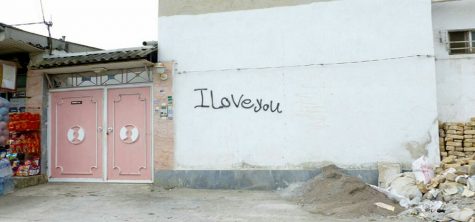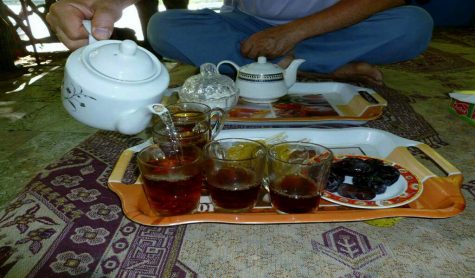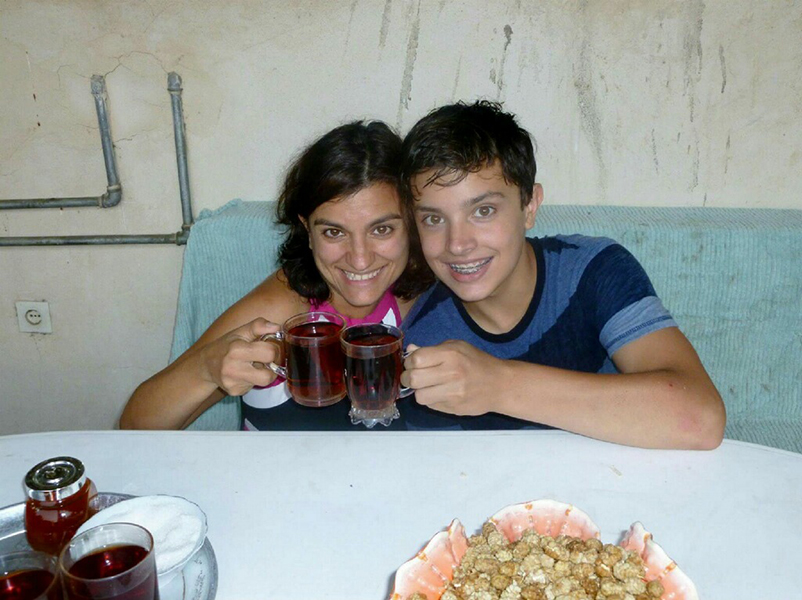Old Country, New Country: A Mother’s Story From Iran to America
Originally Published February 28, 2017:
Of Tehran, the bustling capital city of Iran, Michael Briggs, a senior at Pioneer High School, remembers saffron. It was the summer of 2003, and he remembers the lush, bright colors of spice, metal and fruit shops and being hungry. His mother had temporarily left her husband, son and daughter to find a restaurant to settle into, and in her absence a generous rug shop owner approached the foreign family. He asked Michael’s sister if they were lost, to which she responded by saying that the family wasn’t lost, just hungry.
In broken English, the man invited them to his shop and offered to buy them breakfast.
Within minutes the rug shop owner brought the Briggs trio cheese, honey, bread and tea. His mother returned unfazed by the strangers’ eagerness to invite her family over for breakfast in his shop.
“That’s just something that happens in this country,” she said.
“This country,” Iran, was her own. Michael’s mom, Hedieh Haghighatou was born in Iran before it was the Islamic Republic of Iran. She lived through the Iranian Revolution of 1979 and then the Iraq-Iran war that followed. In 1983, when Hedieh was thirteen, she left Iran for the United States. While the US wasn’t home, she hoped the new country would offer her safety, an education and the bright future she couldn’t find in Iran. In 1983, Hediah joined the ranks of the thousands of immigrants that left in search of something their home country couldn’t offer.
“It was mixed,” Michael said. “It was nice to be in a safe place, it was hard not knowing the language or the culture.”

She found herself at a majority-white school facing Islamophobia and xenophobia. Despite the well-circulated myth of being a ‘lazy’ and ‘dangerous’ immigrant, she picked English up quickly, graduated valedictorian, was offered a full scholarship at Michigan State and got into the University Of Michigan.
“She just wanted to work as hard as she possibly could,” Michael said. “I think that’s something that’s in almost every immigrant: wanting to do everything they possibly can do to succeed, and help other people succeed.”
Michael believes her generosity and drive to help others thrive came from how she was raised. Hedieh lost both her parents in a car crash when she was 2 years old. She was raised by her great-grandparents and had what Michael called a “complicated childhood.”
“She grew up watching her nation first be run by a tyrant—who was backed by America—who allowed people to starve and was brutal to people in prisons and things like that, and then she watched the revolution happen. Originally it wasn’t an Islamic revolution. It was just a revolution in general of wanting to overthrow the government, wanting something new.”
While Michael’s mother was young at the time, she remembers the revolution.
“When your cousins are growing up with are being thrown in jail, you pay attention,” Michael rightfully assumed. Living in Iran’s capital, Tehran, many of his family members fought for freedom and went to jail for it. Michael’s aunt spent months in solitary confinement for passing out pamphlets that helped to mobilize and organize Iranian activists. Hedieh remembers being scared for one of her more vocally political teachers.
“She was just constantly scared that she would show up at school and it’d be a different teacher,” Michael said. Still, Hedieh did her part. She was young, but she was fighting too, in her own little way.
“We’re just like, born revolutionaries. We just need to protest everything wrong with the government and we cannot be silenced. The one thing a Persian woman cannot be is silenced.”
At home, around three decades later Hedieh’s activism comes in the form of a safe house. She’s opened her home to around 50 people in a 25 year period. Many of them are friends of hers from Iran, coming to the country for the same reason she did as a child. She houses them while they regain their balance, get their green cards and find a permanent place to stay. Much like the rug shop owner, Hedieh is eager to serve others through opening her home to the vulnerable.
“It definitely makes the house a lot more lively and you gain a family member,” Michael says of the experience. “Most of them have been immigrants; most of them were not born in this country; most of them had a different religion than my own; most of them spoke a different language than my own. It’s been an amazing experience: being able to see the world through their eyes and being able to see the humanity in all of us from all around the world.”
Hedieh also uses her voice in politics. She’s the Vice President of Washtenaw Democrats and works closely with politicians.
“I think because she didn’t grow up with a democracy she knows how valuable it is, and how it isn’t a right. It isn’t something that’s inherently there. You have to constantly fight for democracy, and she knows that because she grew up without it. She wants people to recognize that, wants everyone to vote even if they’re against her politically.”
This love of democracy comes at a steep and demoralizing cost. On January 27th, President Trump put forth the executive order for the Muslim Ban. The executive order barred citizens from 7 predominantly Muslim countries including Iraq, Syria, Yemen, Sudan, Somalia, Libya and Iran. The order made Hedieh and her family’s life “a lot more complicated.”
“It was extremely depressing, especially for my mom. My dad and I, growing up in the United States, always felt optimistic about the government.”
For Hedieh, however, a corrupt government was all too familiar.
“My mom lived through a revolution and the government doing terrible acts against humanity. She wasn’t as surprised,” Michael said. “She understood that this could happen. She was just devastated that she spent all this time fighting to come to this country that was supposed to be a place for everyone. A place that loved democracy, a place for all people. Just seeing that, those doors shut, was heartbreaking for her. That’s everything she fought for her entire life.”

Despite the pain of the Muslim Ban and Iran’s reaction to ban Americans from Iran, effectively cutting Michael and his family off from visiting his mother’s home country, Hedieh’s tenacity and passion for democracy and freedom echoes in her son.
“When one person hurts, when one person is discriminated against, it brings everyone down,” Michael said. “If you want a freer country, if you want a better country for everyone—including yourself, even if you’re not Muslim—you’ve got to fight.”
For his mother, Michael says, for all of the work she’s done to provide a better life for herself, countless others and her children, Michael would tell her “Thank you. And I would tell her that out of all this hardship only greatness would come.”
All photo’s courtesy of Michael Briggs.

